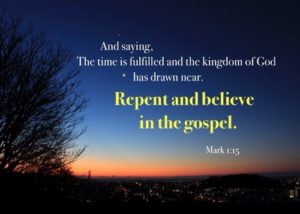 3rd Sunday in Ordinary time – Year B
3rd Sunday in Ordinary time – Year B
Repent and Believe in the Good News
CLICK HERE for a reflection based on the Second Reading of Today.
Little Johnny was basically a good boy. But he had this problem with his temper. He had his bouts of anger that surprised everyone. His mother used to tell him, “Johnny, you are making it difficult for people to love you.”
So, on the New Year day, he made a resolution: “I am not going to get angry anymore.” He went to the back garden, piled together a heap of earth, put a cross over the heap, and wrote on the cross, RIP. His mother and sister were wondering what Johnny was trying to do. Johnny solemnly declared, “This is the grave of the old Johnny. Mum, today I am a new Johnny.”
As the January days rolled by Johnny was faithfully practising his resolution; he never got angry. He made it easy for people to love him. One day in the third week of January, poor guy, he was in a bad mood; he bashed up his little sister. The sister was angry too. She went to the grave of Johnny in their back garden; she removed the placard that said, RIP, and put a new one: “He is not here, he is risen!”
Perhaps this is our own story. Even by the third Sunday of the year, we find that our well-intentioned New Year resolutions have been already broken.
Dear friends in Christ, our life is a process of dying to ourselves, and sadly sometimes, rising again to our old selves. We are all basically good people. That is why, we are here to worship this morning. But often we surprise ourselves with our own nagging habits. Despite our own efforts!
The word of God today invites us to repent!
In the first reading, prophet Jonah (Jon 3:1-5, 10) preaches the message of repentance to the people ofNineveh, following his own story of repentance in accepting the will of God. “And the people ofNinevehbelieved in God; they proclaimed a fast and put on sackcloth.” God accepted their little efforts of reparation! And all was well.
In the second reading,St Paul(1Cor 7:29-31) invites us to be sober and to have the right attitudes towards the world, because, “the world as we know it is passing away.”
The Gospel, from the first chapter of Mark, describes to us how Jesus began his public ministry. Jesus’ first message is, “Repent, and believe in the Good News” (Mk 1:15). As I said earlier, we want to accept this message of Jesus. We want to repent. We want to be good. But we find ourselves frail and weak.
The problem, I think, is that we put the cart before the horse. We want to repent before we can believe in the Good News. We think that we need to be good first so that God can love us. In this way, it is I who am still calling the cards! We want to control God’s love. God doesn’t wait for us to be good, so that we could love us. If he does, he will never be able to love us. That is why, St Paul in his letter to the Roman writes, “So this is proof of God’s own love for us, that Christ died for us while we were still sinners” (Rom 6:8). And our own love for our neighbour is an outcome of our experience of the love of God. The first letter ofSt Johntells us, “We love, because God first loved us” (1Jn 4:9).
So, what is the meaning of “Repent and believe in the Good News”? Repentance and belief are not two separate acts in our movement towards God, but one! In fact repentance could even be a consequence of our belief.
To understand what I am saying we need to ask a basic question: What is the Good News? Is it the sum of all the dogmas declared by the church? Is Good News the collection of the teachings of Jesus? No, not at all. Good News is the fact that God loves us in the person of Jesus. It is a person. Good News is JESUS Himself! Yes, Jesus is the Good News. The kingdom of God is here (Mk 1:15), in the person of Jesus. So belief in the Good News is our acceptance of the reality that we can experience of God in the person of Jesus. And when we do this, we repent. We become our best selves. We are motivated to love others not for any of our own motivations – that could become selfishness – but because we have experienced the love of God in Jesus. Our response to this divine love become a true expression of altruism.
As Mark continues to narrate in the gospel text of today, the apostles were able to leave their fishing nets, their family – things that they held dear (Mk 1:16-20). This renunciation was their sign of repentance. And they were able to reach this decision because they encountered God in the person of Jesus. They believed in the Good News! Their belief was not just an intellectual assent, but a tangible experience God in Jesus.
May we then surrender ourselves in front of this tremendous mystery – Jesus Christ, the Good News! Believe! Recognise the Kingdom that is already here. May this greater power enfold us and transform us. May we become our best selves in the unconditional love of God!